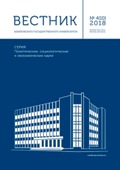Tol'yatti, Russian Federation
The quality of life of people and the degree of focus of market economy on the interests of people depend to a great extent on the structure of public institutes, which include formal and informal norms, rules and the organizations that support them. To develop these norms and rules, it is necessary to rely not only on rational considering and calculation of the interacting parties, but also on habits, customs, and traditions. The universal nature of functions of public institutes always acts in the specific ethical cover that reflects the culture of people, their idea of the social justice focused on three fundamental values: equal opportunities, overcoming excess inequalities, and providing honest rules of the game. The institutionalization process includes stages connected with understanding and acceptance by the majority of the principles of socially oriented economy, development of the particular rules, and mechanisms supporting them. Some institutes perform functions of control over the flaws of the market mechanism, others are aimed at alignment of excess social and economic inequalities and ensuring the compensating advantages to everyone.
social institutes, social market economy, institutionalization of social justice, habit, tradition
1. Stiglitz J. Tsena neravenstva. Chem rassloenie obshchestva grozit nashemu budushchemu [Inequality price. What stratification of society threatens our future with]. Moscow: Eksmo, 2012, 512.
2. Berdnikov V. A., Vakhtina M. A. Instituty sotsialʹnoi spravedlivosti v rynochnoi ekonomike Rossii: sostoianie i napravleniia razvitiia [Institutes of social justice in market economy of Russia: state and directions of development]. Vestnik Samarskogo gosudarstvennogo ekonomicheskogo universiteta = Bulletin of the Samara state economic university, no. 11 (2014): 6-10.
3. Rolz J. Teoriia spravedlivosti [Theory of justice]. Moscow: Izd-vo LKI, 2010, 536.
4. Nort D. Instituty, institutsionalʹnye izmeneniia i funktsionirovanie ekonomiki [Institutes, institutional changes, and functioning of economy]. Moscow: FEK «Nachala», 1997, 180.
5. Rich A. Khoziaistvennaia etika [Economic ethics]. Moscow: Posev, 1996, 809.
6. Granovetter M. Ekonomicheskoe deistvie i sotsialʹnaia struktura: problema ukorennosti [Economic action and social structure: the problem of rootedness]. Ekonomicheskaia sotsiologiia = Economic sociology, 3, no. 3 (2002): 44-58.
7. Veblrn T. B. Teoriia prazdnogo klassa [Theory of an idle class]. Moscow: Progress, 1984, 367.
8. Hodgson Dzh. Ekonomicheskaia teoriia i instituty: manifest sovremennoi institutsionalʹnoi ekonomicheskoi teorii [Economic theory and institutes: manifesto of the modern institutional economic theory]. Moscow: Delo, 2003, 464.
9. Vakhtina M. A. Osobennosti rossiiskoi ekonomicheskoi mentalʹnosti [Features of the Russian economic mentality]. Filosofiia khoziaistva = Philosophy of economy, no. 3 (2011): 158-166.
10. Brennan J., Buchanan J. Prichina pravil. Konstitutsionnaia politicheskaia ekonomiia [The reason for the rules. Constitutional political economy]. Saint-Petersburg: Ekonomicheskaia shkola, 2005, 269.
11. Yefimov V. M. Predmet i metod interpretativnoi institutsionalʹnoi ekonomiki [Subject and method of interpretive institutional economy]. Voprosy ekonomiki = Questions of economy, no. 8 (2007): 49-67.
12. Belokrylova O. S., Vakhtina M. A. Ot «provalov rynka» k «provalam gosudarstva»: eshche raz k voprosu o sotsialʹnoi spravedlivosti v ekonomike [From "market failures" to "failures of the state": once again to a question of social justice in economy]. Journal of Economic Regulation, 7, no. 2 (2016): 6-19.
13. Vakhtina M. A. Sotsialʹnaia spravedlivostʹ kak faktor ekonomicheskogo razvitiia [Social justice as factor of economic development]. Vestnik Permskogo universiteta. Seriia: Ekonomika = Bulletin of Perm University. Series: Economy, no. 4 (2016): 22-30.
14. Vakhtina M. A. Institutsionalʹnye osnovaniia spravedlivoi rynochnoi ekonomiki [Institutional bases of fair market economy]. Samara: Samarskii nauchnyi tsentr RAN, 2013, 265.

















